Duck farming is a very popular, traditional and profitable business in many areas around the world. People are raising ducks from the ancient time mainly for the purpose of food production. Both commercial or small scale duck production systems are popular and practiced in many areas throughout the world.
If you are willing to start this highly profitable business, then you can start commercial duck farming business easily by following this easy steps. Duck products, especially meat and eggs are very popular. That’s why both commercial and small scale duck production is a very old and traditional business in many areas around the world, and the practice is very popular also. It is absolutely an easy, and lucrative business and anyone can start this in almost anywhere around the world
Food demand is increasing gradually, due to increased global population. And people are doing different types of food production business to fulfill this demand and also for making profits. Duck meat and eggs are excellent source of animal protein. And commercial duck farming can be an excellent way to fulfill the increasing food demand.
Commercial production of ducks can be a very good and easy business for making high profits, especially for the beginners. And at the same time it will help to enhance food security. Here we are trying to describe more information about the advantages of this business, and starting and operating guide of a successful duck farm.
What Is Duck Farming?
However, before discussing more about this business, let us first explain ‘what is duck farming‘. Duck farming is a type of agriculture, and it is the practice of raising ducks for their products such as meat, eggs, fat or feathers.
What Are The Advantages, and Is Duck Farming Business Profitable?
Yes, duck farming is a very profitable business. Along with it’s high profitability like many other poultry farming business, commercial duck farming business also has numerous advantages. Here we are trying to shortly describe about the top advantages of commercial duck farming business.
- Ducks are very strong and hardy birds. They generally require less caring and other management. So, raising ducks is very easy and simple.
- As the ducks require relatively less caring, so they are very good for beginners. Beginners can start a duck farm easily with a few number of ducks initially.
- Ducks are smaller in size and generally require less housing space. And their housing requirements are also minimal. They will be happy if you just provide them with basic housing facilities.
- Feeding costs are relatively less if you can allow your ducks to roam freely. They will eat food from the wild. And this will reduce your feeding costs.
- Initial costs for starting a commercial duck farm are much higher. But you will get your invested back within a very short period of time. Ducks generally start laying eggs and produce meat for selling within their 5-6 months of age.
- Ducks can adopt themselves well with almost all types of environmental conditions. So, you can start your duck farming business in almost everywhere.
- Most of the ducks are highly resistant to the common avian diseases.
- Duck meat and eggs are highly nutritious, and both have high demand and value in the local and international market.
- Commercial duck farming business can be a great income source for the rural educated and unemployed people.
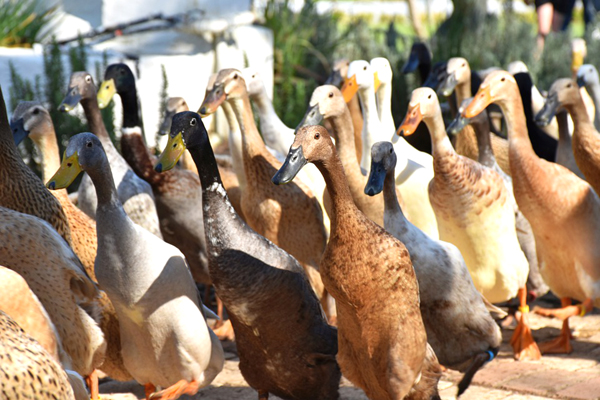
How To Start Duck Farming Business?
Starting duck farming business is very easy and simple. You can start this business easily with a few birds, even if you are a beginner. But try to complete a training first from an institute or practically from an expert before starting commercial production of duck products. Having a complete training will help you to run your business successfully. And try to make a good duck farming business plan before starting. Here we are trying to describe more related information and the essential steps for starting and operating a successful duck farming business.
Complete A Training First
The first step of a successful and profitable duck farming business, is obtaining the training from a trusted source. Actually, completing a training or having practical knowledge is very important for staring and operating any business successfully. Duck farming training is not an exception, and you will be able to run your business smoothly and perfectly if you complete a detailed training about this business. You can ensure good uses of your existing resources (such as land, labor, money etc.) if you can do this traditional business in modern ways.
That’s why completing a duck farming training important. Many universities and agricultural institutions available and they offer courses and resources on duck farming. As the popularity of commercial duck farming business is increasing, so some government and private organizations are providing training to help the rural people. You can also contact your local agriculture extension office to learn more about the training.
Make An Effective Business Plan
Making an effective business plan is also very important for starting and operating your duck farm successfully. You have to make a very good, detailed and effective duck farming business plan before starting this venture. Having a good and effective business plan is a must and it will help you to plan and manage your farm properly.
You should not start a business immediately after thinking about it, or hearing something good about a business. Rather, you should wait and make a good business plan and do everything according to the plan from starting to marketing. You can consult with some existing farmers or experts in your area and ask them for help to prepare your business plan. Try to include everything about this business in your business plan from building house, purchasing ducklings, feeding to caring and marketing.

Select A Good Location For Your Duck Farm
Selecting a good location for your duck farm is also a very important step. Actually, you can start duck farming business in a variety of locations. But you have to think wisely while selecting the location, because the location of a duck farm has significant impact on the success of the operation. You have to consider some factors such as land availability, climate, and proximity to markets. Also review these key considerations when selecting a perfect location for your duck farm:
- Ensure that the selected location has access to sufficient land to support the desired number of birds and associated facilities.
- Ducks require moderate temperatures and access to water, so consider this while selecting the location.
- It will be better if you select a land which is close to market. This will make your purchasing required things and marketing process much easier.
- Consider any local regulations or zoning laws before selecting a location for your duck farm.
- Also ensure you selected location has key resources such as water, feed, and veterinary services. Ducks require a significant amount of water for drinking and bathing. So, ensure the availability of water all time.

Determine The Products You Want To Produce
Determining the products you want to produce from your farm is also very important, and do this before starting your farm. Ducks are mainly raised and highly valued for their various products. Main duck products are meat and eggs. So, determine the products you want to produce from your farm.
Select Good Duck Breeds Depending Upon Your Production Purpose
This is a very important step for a successful duck farming business for making maximum profits. You have to select good and right duck breeds for your business depending on your production purpose. There are actually numerous duck breeds available throughout the world. Although all of those breeds are not suitable for commercial duck farming business. Some of those breeds are suitable for egg production and some are ideal for commercial meat production. Usually ducks are of three types according to their production type.
Meat Duck Breeds: These ducks are very good for meat production purpose, and they are very popular. For example, you can start muscovy duck farming business commercially, because it is a very good meat producing breed. Along with Muscovy ducks there are some other duck breeds available which are also famous for meat production such as Pekin, Aylesbury, Cayuga and the Swedish Blue ducks.
Egg Laying Duck Breeds: These duck breeds are ideal for starting duck farming for eggs. Indian Runner is a very popular egg laying duck breed and these ducks are very famous for their egg production capability. Khaki Campbell ducks are also very popular for high egg production. Some other popular laying duck breeds are Welsh Harlequin, Ancona, Buff etc.
Dual-Purpose Duck Breeds: The duck breeds which are good for both meat and eggs production are called dual-purpose ducks. Some other dual-purpose duck breeds are Khaki Campbell, Pekin, Cayuga, Swedish, Ancona etc.

Purchase Necessary Equipment
Purchase the necessary equipment for your duck farming business .Ducks have specific needs, depending on the breed, and the right equipment can make rearing process easy and simple. Some common equipment required for duck farming business are:
- Water pools or ponds
- Feeders
- Waterers
- Fencing
- Bedding material
- Brooders
- Incubators
- Nesting boxes
- Lighting system
- Cleaning equipment
- Feed storage containers
- Veterinary supplies
- Protective gear
- Office tools for record keeping
Purchase Ducklings From Reputable Suppliers
After selecting the right breed for your production, purchase healthy and active ducklings. Purchasing good quality, healthy and active chicks is very important. Because starting with good quality chicks will ensure good production when they will become mature. Try to purchase the ducklings from a reputable source within your area to ensure that you have healthy birds. Look for a breeder or hatchery within your area that has a good reputation and that specializes in the breed that you are interested in.
Inspect the ducklings closely to ensure that they are healthy and free from defects. You can also ask for help from an expert if you are new in this business. Look for ducklings that are active and alert, with clear eyes and clean beaks. Avoid ducklings that are lethargic, have discolored feathers, or have any signs of illness.
Ensure Good Housing Facilities
A good, secure and comfortable duck housing system is a must for running a successful duck farming business. Ducks generally require ample space to move around and also to engage themselves in natural behaviors such as foraging and bathing. Depending on the breed, you have to provide a minimum of 4-5 square feet of space per bird, with additional space required for nesting boxes and other equipment. Ducks also require access to water for drinking and bathing. So, provide a clean and easily accessible source of water inside their housing system (such as a pond, shallow pool or trough).

Like many other farm birds, the ducks are also vulnerable to a variety of predators, including raccoons, foxes, and birds of prey. So make their housing system in a good way to provide protection from predators, with secure fencing, locks, and other measures. Ensure good ventilation system to ensure adequate airflow. Good ventilation system is essential to maintain a healthy and comfortable environment for ducks. And a good ventilation system also helps to prevent the build-up of moisture and odors that can contribute to disease.
Ducks require nesting boxes to lay eggs. Keep enough nesting boxes inside their housing system depending upon the number of birds. And also try to provide adequate lighting hours, with natural light preferred whenever possible. Adequate lighting can help to ensure proper egg production. Maintain good hygiene inside the house and clean the house on a regular basis.
Ensure Balanced And Nutritious Feeding
Providing the ducks with very good quality and nutritious food is another very important part of commercial duck farming business. And this is the most costly part of the business. A good and balanced duck feed helps to keep your birds happy, healthy and productive. The protein requirements of ducks vary depending on their age and stage of development. Young ducks generally require a higher percentage of protein in their diet than mature ducks. For example, ducklings require a diet containing 20-24% protein, while mature ducks diet should contain 15-16% protein.
Ducks can obtain protein from a variety of sources, including animal and plant-based sources. Animal-based sources of protein include fishmeal, meat and bone meal, and poultry by-product meal. Plant-based sources of protein include soybean meal, corn gluten meal, and wheat gluten meal.

Commercial duck feed is the most common and cost-effective way to meet the protein requirements of ducks. Commercial duck feed is specifically formulated to provide the necessary nutrients, including protein, that ducks require at different stages of development. If you are not an expert, then you can just buy this type of food and feed your ducks.
For providing a balanced diet to your ducks, you have include protein, carbohydrates, fats, vitamins, and minerals. A commercial duck feed that is specifically formulated for ducks can provide all the essential nutrients. Along with providing the ducks with good quality and nutritious food, ensure access to enough fresh and clean water at all times. Change and clean their feeders and waters frequently to prevent the build-up of bacteria and other harmful substances. And make the water source deep enough for ducks to submerge their heads and it will be better if it become large enough for them to swim in.
Reproduction
Duck breeding process is really very easy and simple. Just keep good ratio of male and female ducks in your flock and they will do the rest. Generally, one male duck is enough for breeding around or up to 10 female ducks.

Ensure Good Caring for Ducks
Taking good caring for the ducks is very easy and simple. Because ducks are very strong and hardy birds and they generally require less caring and other management. Providing them with good housing or shelter, ensuring balanced and nutritious feeding, closely monitoring their health and vaccinating them timely will be enough.
Marketing Your Products
Marketing the products to the right consumer is also a very important step for successful duck farming business. Because your venture will not be profitable if you can can’t market your products to the right customers. We recommend targeting your local market first, then local restaurants or any other nearby market. You should determine your marketing strategies before starting this business.
Calculate Profits
Keep records of all costs from the beginning of your operation. And also keep records from when you start selling products from your farm. And after completing a production (either meat or eggs) calculate total profits from this business. Duck farming is really profitable, and we are sure that you will make good profits if you follow all the steps mentioned above.
Share Your Project Report
Share your duck farming project report with us so that new interested duck farmers can learn from your practical experience.
These are the common steps for starting and operating a successful duck farming business. You have to be more careful on taking care of your ducks for making maximum profits from duck farming business. Hope this guide has helped you. Consider sharing this guide with your friends and family members if you find it helpful. Good luck and may God bless you!
Frequently Asked Questions (FAQs)
People often ask several questions regarding this business. Here we are trying to list the most common and frequently asked questions related to duck production business. Hope these questions and answers will help you. Don’t hesitate to ask if you have more questions.
Are ducks farm animals?
Yes, ducks are farm animals. Actually, they are among the most popular poultry birds after chickens. They are very popular farm animals in many farms.
How long do ducks live?
Average lifespan of a duck depends on numerous factors, and it’s very tough to tell the exact number. But in the wild, a Mallard duck has an average lifespan of between 5 and 10 years. Some ducks can even live longer with a lifespan of about 15 to 20 years.
How long do farm ducks live?
Average lifespan of the farm ducks is around or up to 10 years. But unfortunately, they are marketed before reaching their full age. In commercial farms, most of the ducks are sold when they stop laying eggs. Meat ducks are slaughtered even earlier.
Is duck farming for eggs profitable?
Yes, duck farming for eggs is a highly profitable business. Duck eggs are very tasty and nutritious. And they have very good demand and value in the market. So, your venture will be profitable if you start duck farming for eggs.
How profitable is duck farming?
Duck farming is a very profitable business. You can make good profits from this business if you can start by using the steps mentioned above. Although, it’s not possible for us to tell the exact amount, because it depends on numerous factors and can vary from place to place.
What is rice duck farming?
It is an integrated system where your existing paddy field is used for both rice production and duck keeping.
How long do ducks lay eggs?
Ducks lay eggs for several years. The exact age when they stop laying depends on numerous factors, and varies mostly depending on the duck breed. But naturally most of the ducks continue laying eggs up to around 8-10 years of age or even more depending on the breed. But for commercial farm duck farming business, you can expect good number of eggs production for their 3 years of age, and then the ducks gradually decrease laying eggs.

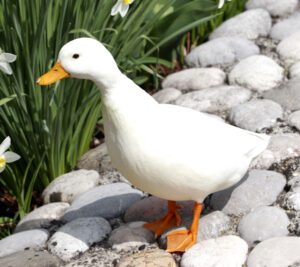
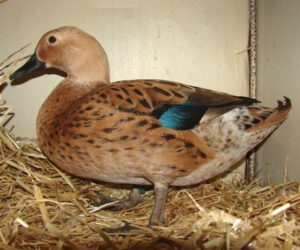

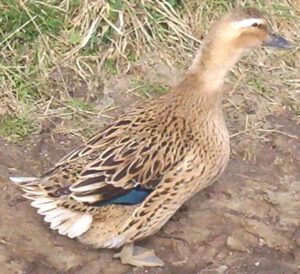
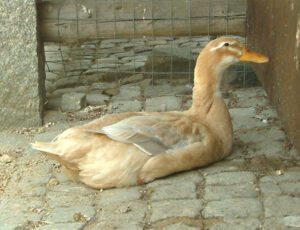
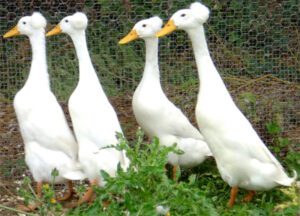
We are interested in starting a small duck farm in uganda. Advice us on what to do or farm design details.
Thank you and best Regards,
Francis Ederu
What type of ducks are available in your area? Housing or farm design is same as chickens. And it also depends on your budget. Thanks!
What type of ingredient are used in making their feed?can ducks stay with our bird’s? Any local way to hatch without incubator? I am greatful for the information you have given.
Review the duck feed page on our website for more info. Yes, the ducks can stay with your birds. You can use broody hens or ducks for hatching eggs. Good luck!
Honestly you have given an elaborate explanation, which gave me a courage for Duck farming. By 2022 I will start my farm.
Go ahead! Good wishes for you!
Am grateful to you for taking your previous time sharing vital information about ducks to us , God bless your heart
Is duck farming profitable in Bangla? Especially in the southern areas? Please answer.
We are actually not clear about your question. What do you want to mean by Bangla? Do you want to mean Bangladesh or West Bengal State of India? Commercial duck farming is possible in both Bangladesh and West Bengal State of India. Because both of these areas have lots of natural water reservoirs, which are very beneficial for duck farming business. You can definitely start commercial duck farming business for both meat and eggs production in these areas. There are many duck farms available in these areas to learn from and also for collecting hatching eggs or ducklings. You can plan for this business without any doubt. Start with a few ducks, learn practically and expand gradually. Good luck & May God bless you!
Thank you for the very informative information shared. I would love to start my own duck farming business as I have access space of land, but water is the problem, so I am deciding to make Bou water to supply for the ducks. I will purchase the feeders from the local shops to feed them. I am new to this business and can see a profitable income stream if I start now.
Thank you so much for your time and hope to hear from you soon.
Yes, such artificial water source will work fine. Go ahead and may God bless you!
I am from Thailand. And currently I have more than 60 laying ducks, and 11 male ducks. Currently I am getting around 40+ eggs daily. ROY’S FARM helped me a lot for starting and operating my duck farming business. So, thank you very very much! And may God bless you!
We are very very pleased to hear that. Good luck!